It has been congestion week for me. A celebration of traffic management failure.
Last week I was inspired by the thought that Copenhagen has so many cyclists they suffer traffic jams and road rage.
I have spent much of the past two weeks discussing congestion too. The EU is currently accepting pitches for its research budgets and included in the offer is some substantial funding to address the congestion that is slowly paralysing many cities and roads throughout the union.
I am involved because one of the approaches that needs validating is the effect of more cycling and walking on congestion. We are working with some partners to prepare better evidence to stop politicians panicking every time a local lobby says cycling facilities and pedestrianized city centres cause congestion.
So we have been locked in rooms having some really interesting discussions with cities about their commitment to their transport problems and in general it has been quite refreshing, because of course the people we are sitting with are the enthusiastic partners.
However for those of us based in Brussels it has also been congestion week for another reason. Just a few days ago the trial of a “kilometre tax” was announced which will test the effect of charging 1200 drivers for the distance they travel in Brussels. Something is needed because the city and its surroundings regularly feature in the lists of Europe’s most congested cities and is getting steadily worse. I was watching an item from Brussels on the BBC News that just about sums it up. They have one of those back projections behind the reporter that supposedly shows a typical city skyline. The Brussels one always shows just a huge queue of traffic gridlocked around the EU district from morning till night.
However there has only been one noise louder than the traffic this week. That is the sound of politicians of all parties running as far as possible from the congestion charge. And in Belgium that is a hell of a lot of politicians. To start with there are at least 12 parties but they are then divided up into the Federal Government and the regional parliaments for Brussels, Flanders and Wallonia. Guess what, there are elections coming up so they are all dashing furiously for cover, much to the disappointment of anyone who hoped that this might be a start in the right direction. Apparently the possible trial was buried in the small print of a proposal to try and ease freight congestion, but now the politicians have left the Minister for Mobility in Brussels region to carry the can as they say “no we didn’t mean that”. Astonishingly even the Greens (Ecolo) (*see comments) have distanced themselves because “the measure might adversely affect people on low incomes”. All this goes against a backdrop of every previous failed initiative such as sensible stuff like reducing parking or madness like the short-lived Flemish proposal to add more lanes to part the Ring motorway. They never head the expression “Building roads to ease congestion is like loosening your belt to cure obesity”. It is just madness.
So where does all this fit into my cycling blog?
Brussels cycling has apparently quadrupled from 1% of traffic to about 4%. City officials are patting themselves on the back because they have put in a very few cycle lanes and quite a bit of paint on the roads, but mainly they have been completely blocked by the politics of the region and the fiefdoms of 17 commune mayors who regard the loss of a single parking spot as an act of treachery from outside.
So why the growth? Because if you make everything else bad enough people will ride bikes. Despite the fact that the cars slow the bikes far more than the bikes block the cars and the white paint on the roads is frankly useless it is still quicker and easier to get around much of our part of Brussels by bike than anything else. And for people who have to make multiple stops like dropping off kids on the way to work the parking congestion makes the bike an even bigger winner.
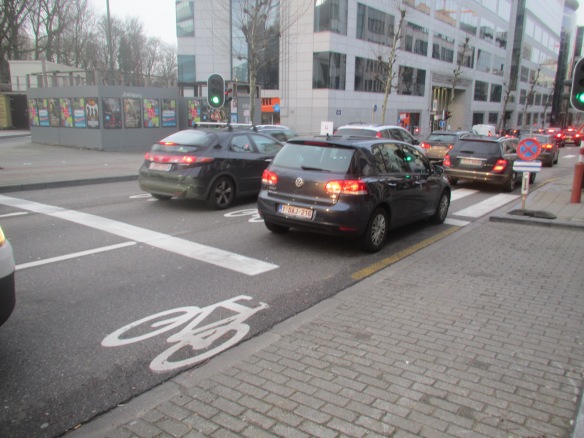
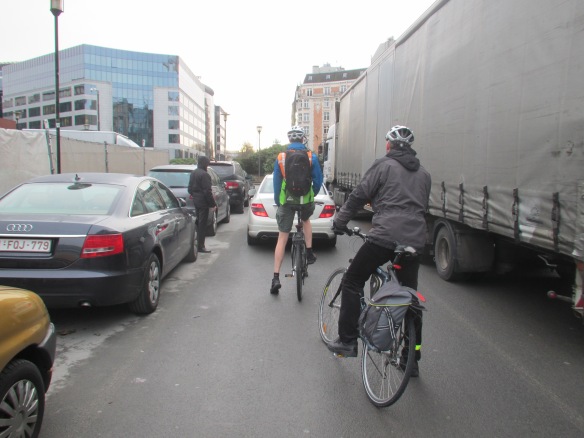
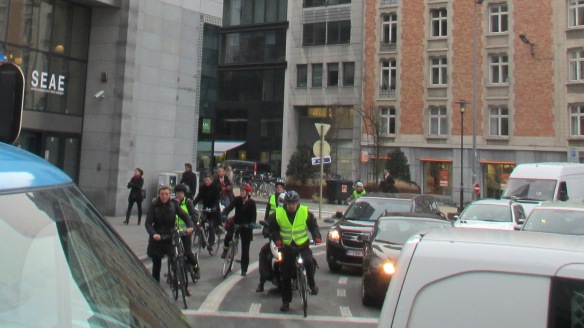 So here we all are in Brussels – the congestion busters. Up the outside of the parked cars, up the pavements and even occasionally squeezed into the cycle paths. Sadly when we look at our research into congestion I am sure we will find once again that the number of people prepared to try cycling like this is limited to about 5% of the population, the rest are just too scared. So the Brussels cycling boom has just about reached its limit until somebody has the political clout to impose themselves on the driving congestion. Don’t hold your breath waiting for that to happen.
So here we all are in Brussels – the congestion busters. Up the outside of the parked cars, up the pavements and even occasionally squeezed into the cycle paths. Sadly when we look at our research into congestion I am sure we will find once again that the number of people prepared to try cycling like this is limited to about 5% of the population, the rest are just too scared. So the Brussels cycling boom has just about reached its limit until somebody has the political clout to impose themselves on the driving congestion. Don’t hold your breath waiting for that to happen.
Copenhagen we are not. It really is not a solution. But those of us who are riding will not despair when the politicians fail us.

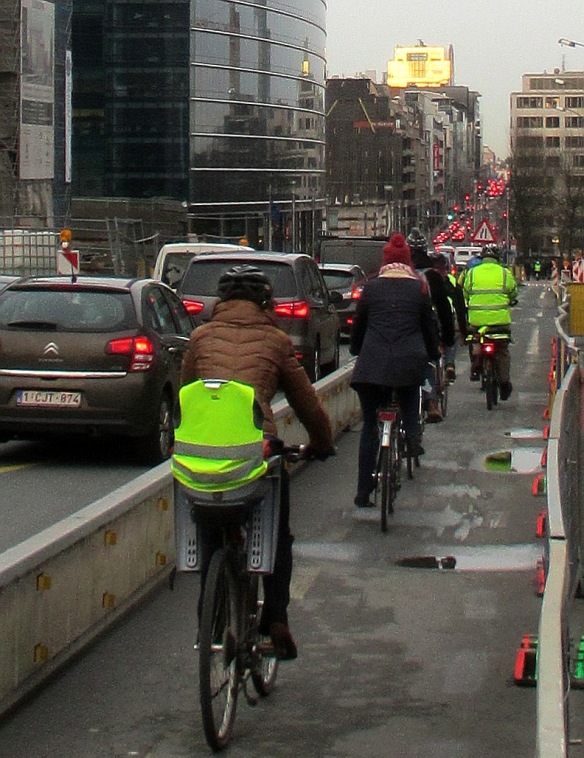
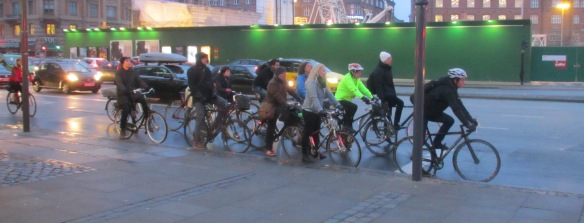
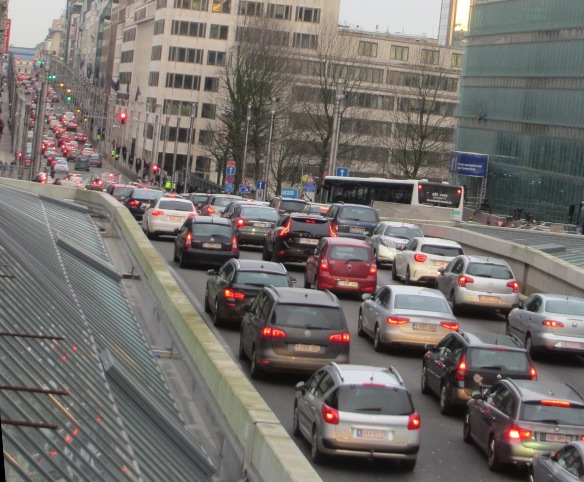
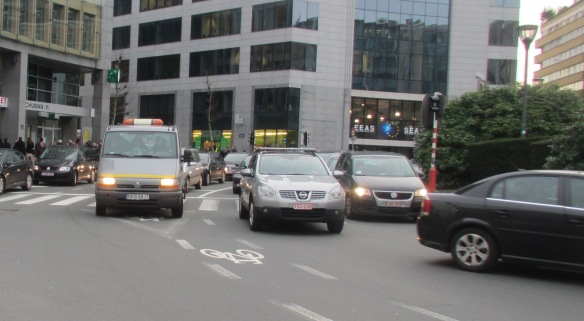
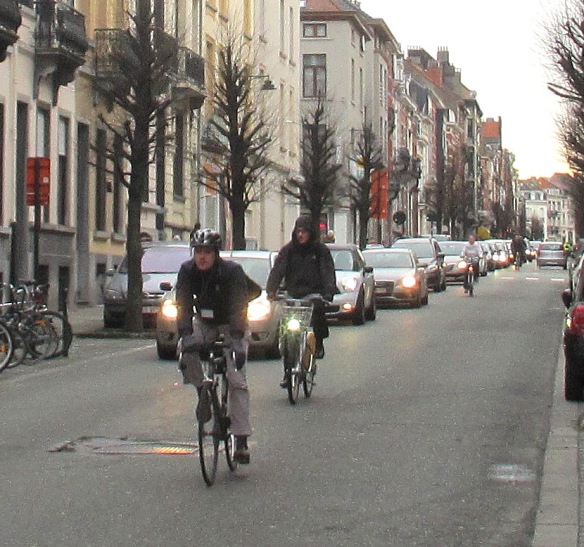
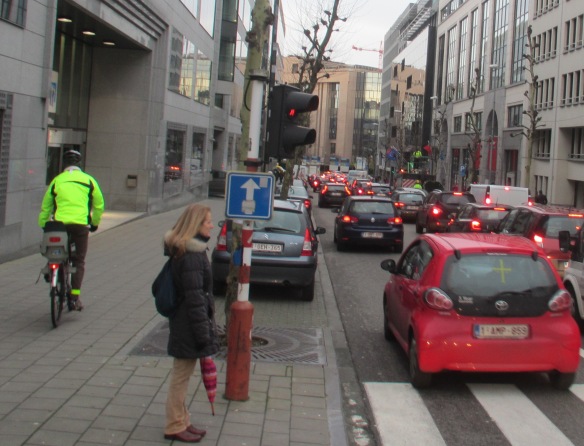
It used to be that you could tell when you were in Wallonie or Vlaamse part of Belgium, as your train rolled through. In the North there would be a stack of basic bikes with folk in ordinary clothes, waiting for the crossing barriers to lift – in the South hardly any cyclists, unless a pack was out riding in their cycling gear.
So it was disappointing to see so many helmets and hi-viz jackets on view, unless you were out with a delegation of MEP’s from low-cycling member states.
About the only detail that really works is the Eurostar Brussels check-in. in terms of passenger facing service, my experience and from reports by others using bikes, it is head & shoulders above London, and Paris is the bottom of the pit. How one operation should display such contrast across just 3 main boarding points amazes me. Hardly surprising I guess that cities also show such wide variation in how they ‘do’ cycling in general.
One detail that you might let us know more about – How do roads authorities learn from investigation of crashes, and then act accordingly. For the UK compare the published reports from the RAIB on any serious rail incident (and often not a single passenger killed in a year), against around 3000 deaths/year, with a known under recording of just the crash data, and a big question of whether any roads authority can genuinely say they comply with Section 39 of RTA 1988 (to investigate crashes and act on results to remove the hazard/reduce the risks). No s.39 reports are published, and neither are the Police or insurers reports, although these tend to be partial, seeking to apportion guilt or liability or both after a crash.
We have at least 2 examples where the Lady Bracknell line rings a damning call – to have one fatal crash is unfortunate, to have two or more at the same location looks like carelessness (or culpably negligent?)
What measures exist across Europe to get open and published investigation of road crashes, and deliver changes to prevent their recurrence?
LikeLike
Hi Dave – a multifaceted comment as ever.
Helmet wearing is common but not over the top but hi-viz is very much part of the uniform in Brussels. Lots of free ones handed out probably helps.
Agree about Eurostar Brussls even for folding bikes – they never enforce the bag rules and let you wheel the bike to the door. Not in the UK.
Crash investigation is not something I think we have ever worked on and it definitely would not be an EU policy area I am sure, strictly devolved matter.
Best wishes
LikeLike
Your photos really highlight the problem. Unless bike lanes are filled with bikes, the car traffic will swell into them. It does require a lot of cycling maturity and a bit of bravissimo as well to cycle in these conditions. Keep fighting the good fight.
LikeLike
Thanks – not that I do any personal campaigning in Brussels, but all credit to Graq and Fietsersbond who do, I try to support them.
LikeLike
We’re planning some riding in Belgium this coming spring – and we’ll do our best to avoid Brussels.
LikeLike
Glad to hear it. A much overlooked country for cycle touring as I have written elsewhere.
LikeLike
*Footnote.
For those outside the complex landscape of Belgian politics I should have said that Ecolo are the French speaking Greens. To their credit the Flemish Greens (Groen) have stuck to their position and continued to support the kilometre tax even as the rest have walked away. All credit to them
LikeLike
Very good feature as usual, Kevin. The cycle lane on Rue de la Roi is in continous jeopardy as pedestrian fail to recognize it actually IS a cycle lane. The social conditions of that road are really the best rebuke city dwellers address (in spite of themselves) to the politicians.
LikeLike
Thanks Alessio. You of course have seen it, it certainly should be an embarrassment to the EU officials who look down on it every day
Kevin
LikeLike